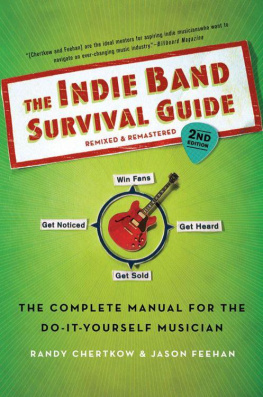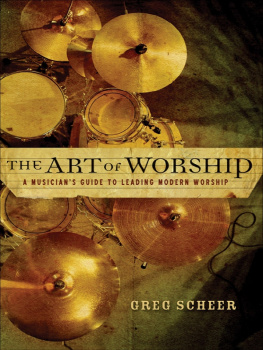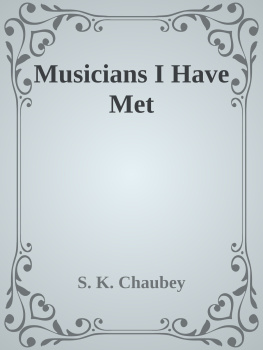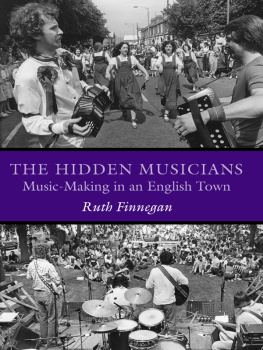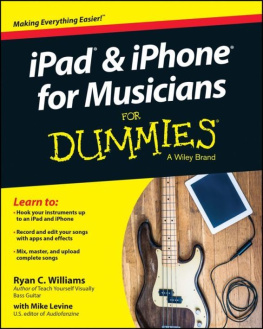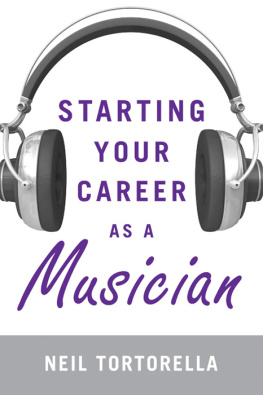

The author and publisher have provided this e-book to you for your personal use only. You may not make this e-book publicly available in any way. Copyright infringement is against the law. If you believe the copy of this e-book you are reading infringes on the authors copyright, please notify the publisher at: us.macmillanusa.com/piracy.
Dedicated to musicians everywhere
TABLE OF CONTENTS
INTRODUCTION TO THE SECOND EDITION
REFERENCE PAGE: IndieGuide.com/Intro and IndieGuide.com/Book
WELCOME TO the second edition of The Indie Band Survival Guide: remixed and remastered, an even more practical, expansive how-to manual to getting your music heard, distributed, sold, booked, promoted, and seen in todays Internet-powered music industry. In the past, what we cover in this guide would only be possible if you had the backing of a major record label, but you can now do it on your own. Well tell you how to get started, give you tons of practical ideas you can implement right now to build your fan base and get your music in front of people, and, unlike most books on this topic, give you practical, step-by-step recipes that lay it all out in plain English so you can put it to use for you and your music.
HOW THE SECOND EDITION IS DIFFERENT
When we wrote the first edition of the guide, we hoped to achieve what one reader of the original online PDF that inspired the print book e-mailed us to say: I get it. A dog-eared copy in every battered instrument case, eh? That image stuck with us throughout the writing of that book. It kept us focused on our goal to write a book that indie musicians like ourselves would use in the real world and would refer to often. And, from all the positive reviews, e-mails, and comments weve gotten in the four years since the first edition came out from musicians around the world, its gratifying to know we hit our goal.
But then, were not ones to sit still. After all, were in a band thats written, recorded, and produced twenty albums and released a song every day for an entire year. Sitting still really isnt in our vocabulary.
If the first edition was about doing, this second edition is the same, just cranked to 11.
In the first edition we needed to spend a lot of words explaining things like what Twitter was and why that strange site was so important and useful to musicians. Today, its a given. Everyone knows Twitter.
But because so much since the first edition is now accepted and gone mainstream, we can cut out most of the superfluous explanations and instead outline clear, step-by-step instructions on what exactly to do .
We also cut out the little bit we had about major labels. The world has continued to move on, making it better to be a musician today than when we wrote the first edition. Musicians like George Hrab, Gavin Mikhail, and a host of others we wrote about in our previous books have only continued to make their living through musicand theyve been joined by other indies in this edition such as The Gregory Brothers, Pomplamoose, Pogo, and more. Jonathan Coulton, in particular, has continued to grow his fan base on his terms. Hes funded his album Artificial Heart on his own, hired John Flansburgh of They Might Be Giants as the producer, and even put together a backing band. Coultons broadened the concept of the concert by organizing a weeklong Caribbean trip aboard a cruise ship. And hes continued to create music for video games (Portal 2) and license music to others. He told NPRs Planet Money that, as a musician, it makes sense for him to stay indie and just hire the skills and services he needs when he needs themwhich is exactly what we talk about in this guide.
So, if you picked up this book to revel in a lament about a music industry long gone by, or the clash between big content versus Silicon Valley, or the debate over whether, if everyone can make music, culture as we know it is over, then we cant help you. Grab any other book on the same shelf if you want theories, debates, or feel-good motivational text. This book focuses on what matters: laying out in clear step-by-step language exactly what you need to do to get out there and start winning fans.
WHO THIS BOOK IS FOR
Although this book is entitled The Indie Band Survival Guide, this book is not just for bands. We use the words band, musician, and artist interchangeably throughout this book.
This book is for all musicians, from hobbyists to professionals. Its useful for musicians of all ages, from teens starting their first garage band to retirees who have rediscovered their love of music and want to share it with the world. It will be indispensable to you whether or not you have a lot of experience with the Internet. The Guide will explain how to use all of the talents that you already have and supplement them with tools and techniques to accomplish what was only possible for major-label musicians in the past. And keep in mind, the guide is intended to show you how to succeed whether you do it yourself or direct other people or services (many of which are free!) to do it for you.
Its also for managers, bookers, labels, promoters, recording engineers, music-video directors, filmmakers, and anyone else who works with music.
And, because this book provides clear and practical techniques on how best to succeed in todays disrupted, Internet-powered music industry, the book is especially useful for music schools, music business schools, and teachers.
But its not just for those working in the new music industry.
Much of what we share in this book is useful for any creative endeavorwhether youre an indie author, blogger, comedian, podcaster, YouTuber, filmmaker, producer, or director; you dont have to be a musician to get a lot out of this guide, even though our focus is on how each topic relates to music. For instance, when we explain how to create Web sites, we specifically cover the creation of music Web sites, even though we share principles of good Web site design that any site should use.
More than anything, at the heart of this book are essential techniques for anyone who wants to get their music into the world.
WHO ARE WE ANYWAY?
We are lead members of Beatnik Turtle (beatnikturtle.com), an indie band with fifteen years of experience; twenty albums and nearly five hundred songs to our name; years of live shows; music thats been licensed to Disney, Viacom, and others; college-radio play; countless podcast plays; theater shows at venues such as the world-famous Second City; TV theme songs, music videos, Web sites, and a completed Song of the Day project, through which we released one song for each day of 2007 (TheSongOfTheDay.com).
We are also two working professionalsan IT expert and an attorneyand weve brought all the knowledge and experience from our respective fields to bear on this book, just as you will take advantage of your own skills beyond those in music to make your band a success. Were like other musicians who found that they had skills in photography and started to take pictures for bands, or discovered they were good at recording so also set up a studio. Because of this, weve been columnists at Electronic Musician magazine, where we wrote the DIY Musician column, as well as feature articles and interviews. We also write for a variety of Web publications, blogs, and journals and teach music business in Chicago at the Music Industry Workshop (miworkshop.com). And, most important, we run the free and open IndieGuide.com, created to help musicians find the resources they need to succeed.
Next page
